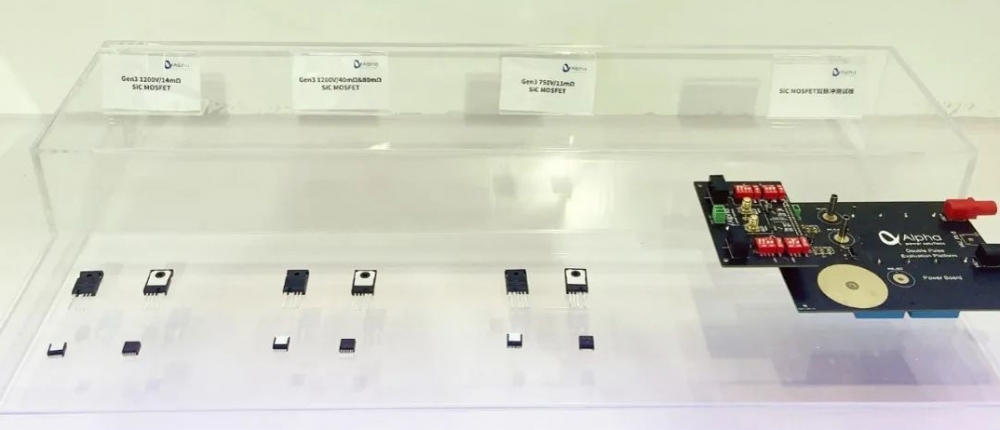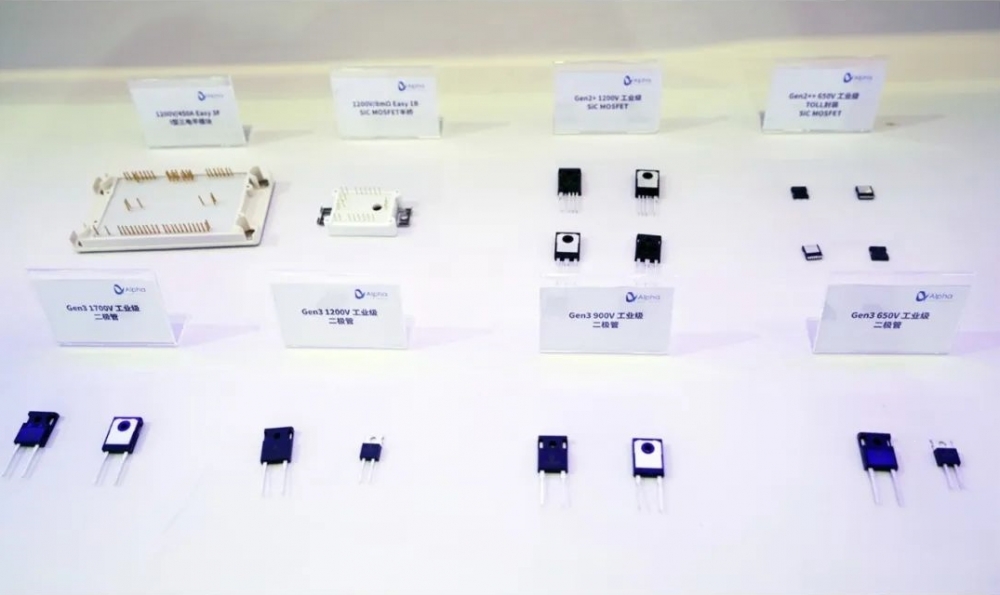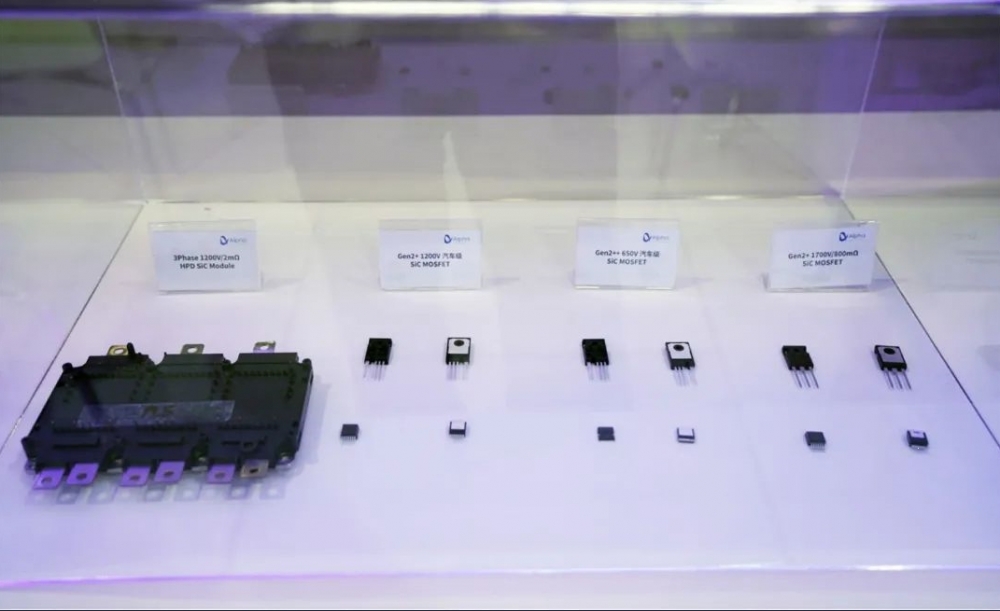Interview with APS CEO Mr. Chau Wing Chon: Domestic silicon carbide leads industry change, and industrial development welcomes new opportunities
From October 30 to November 1, 2023, the Electronica South China Exhibition was held at the Shenzhen International Convention and Exhibition Center (Bao'an New Venue). This exhibition gathered over 1100 well-known domestic and foreign enterprises, with the theme of "integrated innovation." It focused on popular technology applications including 5G, IoT, automotive, carbon neutrality, third-generation semiconductors, industrial automation, machine vision, wearable devices, consumer electronics, smart homes, and more.
As China's leading supplier of third-generation silicon carbide power semiconductor devices, APS was invited to participate in the event and showcased a series of innovative achievements on the booth, including third-generation SiC MOSFET, SiC diodes, new energy vehicles, DC charging module, and photovoltaic energy storage.
“Future Semiconductor,” a news outlet that was invited to the event, was fortunate to interview Mr. Chau Wing Chon, the founder and CEO of APS, to share the development prospects and market trends of silicon carbide devices.
Q: Please introduce APS
Chau Wing Chon: APS is a leading supplier of third-generation silicon carbide power semiconductor devices in China, and one of the earliest companies in China to engage in research and development of silicon carbide devices. We are the first to successfully use 6-inch silicon carbide (SiC) technology in China, achieving domestic technological breakthroughs in this field. APS's headquarter is located in Shanghai, with subsidiaries in Shenzhen, Hong Kong, and Beijing.
The company adopts the CIDM strategy to provide silicon carbide products for popular fields such as new energy, photovoltaic energy storage, and DC charging modules, providing solutions for carbon neutrality.
Q: Please introduce the company's silicon carbide device product line, including main specifications and application areas
Chau Wing Chon: The company's main products are SiC MOSFET and SiC diodes. As of the third quarter of 2023, APS cumulative shipments of silicon carbide devices has exceeded 20.5 million pieces.
SiC MOSFET covers a variety of mainstream specifications in the market. To meet the needs of different voltage applications, it has a voltage rating ranging from 650V to 1700V and an on-resistance ranging from 11-800mΩ. In 2021, APS took the lead in achieving the commercial production of SiC MOSFET, reducing its dependence on imported silicon carbide and gradually promoting the process of domestic substitution. Gen 2++650V 30/45/60mΩ and Gen2+ 1200V 35/70/160mΩ MOSFET have passed the automotive AEC-Q101 reliability verification and the stringent 960V high-voltage H3TRB test. In 2023, the third generation of SiC MOSFET was successfully launched, further enriching the SiC MOSFET product line. This includes 1200V 14/18/30/40/80 mΩ, which uses TO247-4 and TO263-7 packaging forms.
There are more than 70 types of silicon carbide diodes in the market, covering the mainstream specifications. They use APS's proprietary Buffer JBS structure, substrate thinning and low Schottky contact technology, and are equipped with industry-leading packaging. APS has became one of the first companies in China to mass produce and ship 1200V SiC devices in 2019, and its product performance and quality have reached the level of international giants.
The company's main product 1200V MOSFET has been shipped in large quantities, especially in new energy vehicle fields such as DC charging modules, with a zero failure rate and a steady upward trend in shipments.
Currently, APS silicon carbide products are mainly used in the fields of DC charging modules and photovoltaic energy storage, and have been supplied in large quantities to leading companies in these fields. The cooperation between automotive-grade MOSFET and key customers in new energy vehicles has achieved significant breakthroughs, and the depth and breadth of business cooperation intentions will continue to expand in the next 2-3 years.



Q: What are the core competencies of the company at present? Compared with domestic or international competitors, what advantages do APS have?
Chau Wing Chon: The semiconductor industry is an industry that requires preparation and the slow accumulation of experience. Only the simultaneous accumulation of technology, talent, products, and markets can ensure the competitiveness of the company's long-term development.
In terms of talent, APS has gathered a top-notch talent team in the field of power devices in China. Several core leaders have served as senior executives in companies such as SMIC and Silan Microelectronics. The core R&D and marketing teams come from leading international semiconductor companies such as STMicroelectronics, Infineon, and ON Semiconductor. They have excellent professional skills and rich experience in FAB operations, wafer mass production, and manufacturing. They have resources from the entire industrial chain from design to manufacturing.
In addition, APS has conducted research and development in the field of silicon carbide devices for many years and has accumulated rich technology and experience. It has obtained more than 40 independently developed patents, including more than 10 core technology patents, and has more than 50 patents under application. In the field of domestic power devices, APS is in a leading in terms of the accumulation of technology and research and development capabilities. Moreover, domestic enterprises have made great progress in the manufacturing process and production capacity of silicon carbide devices which can meet market demand.
Relying on the dual-wheel drive of design capabilities and process capabilities, APS has created multiple precedents in China:
Takeing the lead in producing 6-inch silicon carbide devices from silicon wafer foundries; Taking the lead in producing and shipping a large number of 1200V silicon carbide devices, greatly reducing import dependence; Taking the lead in adopting Thinning Technology in the production of silicon carbide diodes; Being the first JBS architecture with independent patents; Achieving automotive grade products and complying with the AEC-Q101 standard; Being one of the few companies that has achieved mass production of silicon carbide MOSFETs.
Compared with international competitors, domestic silicon carbide companies have certain advantages in the local market. The demand for silicon carbide devices in the domestic market is growing, and APS has high market adaptability and flexibility, enabling it to better understand and respond to the needs of local customers in a timely manner. In addition, it also has certain advantages in cost control, and can provide more competitive products and prices.
Q: How does the company maintain the relationship between upstream and downstream supply chains by adopting the CIDM model?
Chau Wing Chon: For companies adopting the CIDM model, maintaining the relationship between upstream and downstream supply chains is very important.
In terms of epitaxy and substrate, we have chosen to establish a stable and close partnership with foreign substrate raw material suppliers and CEC Compound to ensure the stable and efficient operation of the supply chain. We have partnered with wafer foundry GTA Semiconducor, the earliest foundry in China to mass produce 6-inch silicon carbide devices, for chip production. Through their manufacturing capabilities and resources, we are able to produce products and achieve high-quality delivery.
Q: Does the company carry out research projects or technological cooperation with partners? If so, what do you think of the significance of such cooperation in promoting the development of the silicon carbide device industry?
Chau Wing Chon: APS has been closely cooperating with Peking University, Hong Kong University, Hong Kong University of Science and Technology and other institutions on various research projects and technical cooperation for silicon carbide materials and devices. In 2022, APS also joined the "Microelectronics Technology Alliance" led by the Hong Kong Academy of Applied Sciences, jointly developing silicon carbide power modules and silicon carbide packaging technology with multiple well-known universities in Hong Kong.
Through technical exchanges and cooperation with these universities, we can solve technical problems, accelerate technological innovation, and develop products together. In addition, we can strengthen resource integration and sharing, jointly cultivate microelectronic innovation talents, jointly develop integrated circuit product processes with Chinese characteristics, and improve the overall competitiveness of our semiconductor industry.
Q: The advantages of silicon carbide technology are well known. What are the bottlenecks and obstacles that need to be overcome for a strong rise in the future?
Chau Wing Chon: The silicon carbide industry chain has a huge market space, but it also has high industry barriers. Although silicon carbide technology has many advantages over silicon, it still faces some challenges in its development, such as manufacturing processes and costs.
Firstly, the reliability of silicon carbide devices still needs to be improved, with the most critical factors being the drift of device threshold voltage (Vth) and the reliability of gate oxide. These are also core parameters for evaluating the technical reliability level of various silicon carbide MOSFET products. Secondly, the price of silicon carbide devices is approximately 2-3 times that of silicon devices, and the high production cost limits their large-scale application.
The methods to reduce costs are: first, increasing the wafer size from 6 inches to 8 inches. Under the premise that the tape-out cost is similar, 8-inch wafers can produce more usable chips and reduce the cost of individual chips; second, reducing the chip area through advanced technology or design; third, improving the yield through process optimization.
Due to the shortage of silicon carbide materials, the market demand exceeds supply. The supply chain verification cycle is also long, and the window period for industrial introduction is limited. However, with the expansion of the market, capital investment, and technology optimization, these problems can be solved one by one.
Q: As one of the earliest companies engaged in the research and development of silicon carbide devices in China, please talk about the development and market prospects of silicon carbide devices.
Chau Wing Chon: As the core of the third generation of semiconductor materials, silicon carbide is a strategic and fundamental industry that supports economic and social development. It also safeguards national security. It has been included in the "14th Five-Year Plan" for industrial technology innovation-related development planning. The country has successively issued policies such as the "Guiding Catalogue for the First Batch of Application Demonstration of Key New Materials (2019 Edition)" and the "2020 Annual Project of Key Special Projects for 'Strategic Advanced Electronic Materials' to support its development.
The "Made in China 2025" plan clearly proposes to vigorously develop the third-generation semiconductor industry and, and silicon carbide devices are applied in various fields of "new infrastructure" such as 5G infrastructure, new energy vehicle charging pilds, ultra-high voltage, and rail transportation. In addition, China is also the world's largest new energy vehicle market. As the penetration rate of domestic pure electric vehicles and hybrid electric vehicles continues to increase, the demand for silicon carbide MOSFETs in the domestic market is also increasing, causing the silicon carbide industry to face huge development opportunities.
Although China's silicon carbide technology, it took only a few years to catch up with the research and development level of foreign countries. As the core link of the industrial chain, domestic silicon carbide substrate companies have developed rapidly. At present, the main size of silicon carbide substrates worldwide is 6 inches, and leading domestic companies are also working towards the development of 8-inch production lines. The gap between domestic and foreign manufacturers is gradually narrowing. In the field of silicon carbide diodes, domestic manufacturers have matured their technology and reached the level of foreign manufacturers. In terms of slicon carbide MOSFET, our silicon carbide MOSFET has also achieved a voltage range of 650V-1700V. Although there are still gaps in the on-resistance of domestic silicon carbide MOSFET when compared with foreign manufacturers, we are catching up quickly. Domestic manufactures are actively planning ahead. In the future, it is expected that through in depth collaboration between upstrean and downstream of the industrial chain, domestic silicon carbide devices will gradually be used as a replacement in all application fields.
In 2015, APS began to develop 6-inch silicon carbide products and has accumulated years of experience in this industry. Now, it has finally ushered in the vigorous development of the domestic silicon carbide market.
Q: Future development plan and company goals
Chau Wing Chon: At present, we have supplied our products in batches to leading customers in the fields of photovoltaic energy storage and DC charging modules, laying a stable foundation for further development.
The next step is to strengthen the research and development of new-generation silicon carbide MOSFETs, and actively lay out the new energy vehicle field. Our automotive-grade MOSFET products have been sent to multiple customers for verification, and preliminary cooperation has been reached with leading enterprises in the new energy vehicle field. At the same time, we are also actively expanding other customers in this field and are striving to win more market share.
Chau Wing Chon
APS CEO
Mr. Chau Wing Chon has nearly 30 years of rich experience and profound knowledge in the semiconductor field. He has served as an executive at well-known international semiconductor companies such as SMIC, Micron Technology, and Texas Instruments. He has extensive experience in FAB operations, wafer mass production, process integration, technology markets, and has a deep understanding of the semiconductor supply chain.
Chau Wing Chon is committed to pioneering innovation and continuous improvement, leading the industry's top technical team to provide excellent silicon carbide products and provide solutions for carbon neutrality. Under his leadership, APS pioneered the successful use of 6-inch silicon carbide (SiC) technology in 2015, achieving technological breakthroughs in this field in China. Various SiC diodes and SiC MOSFETs were subsequently launched and successfully commercialized for mass shipment. APS will continue to work hard to bring more innovations and breakthroughs to the industry.
